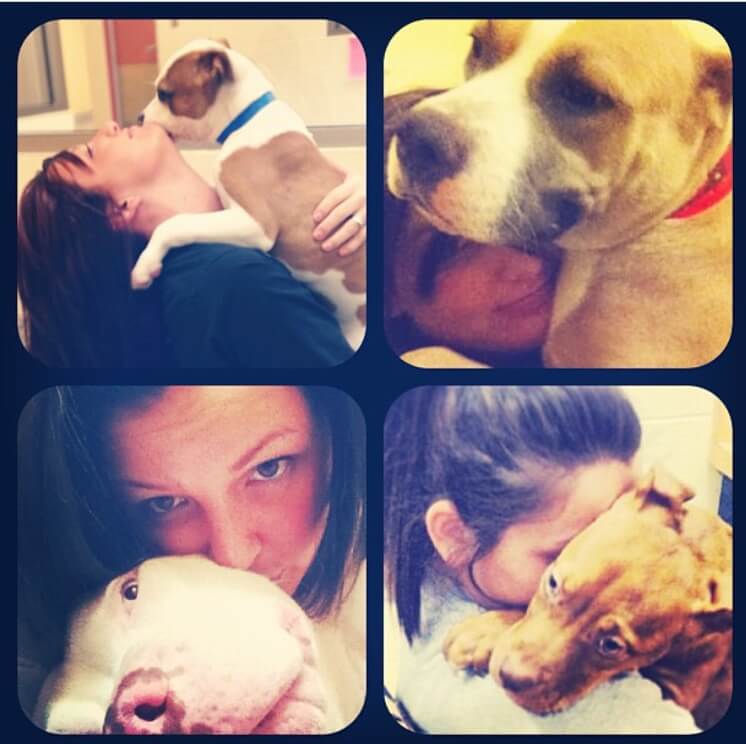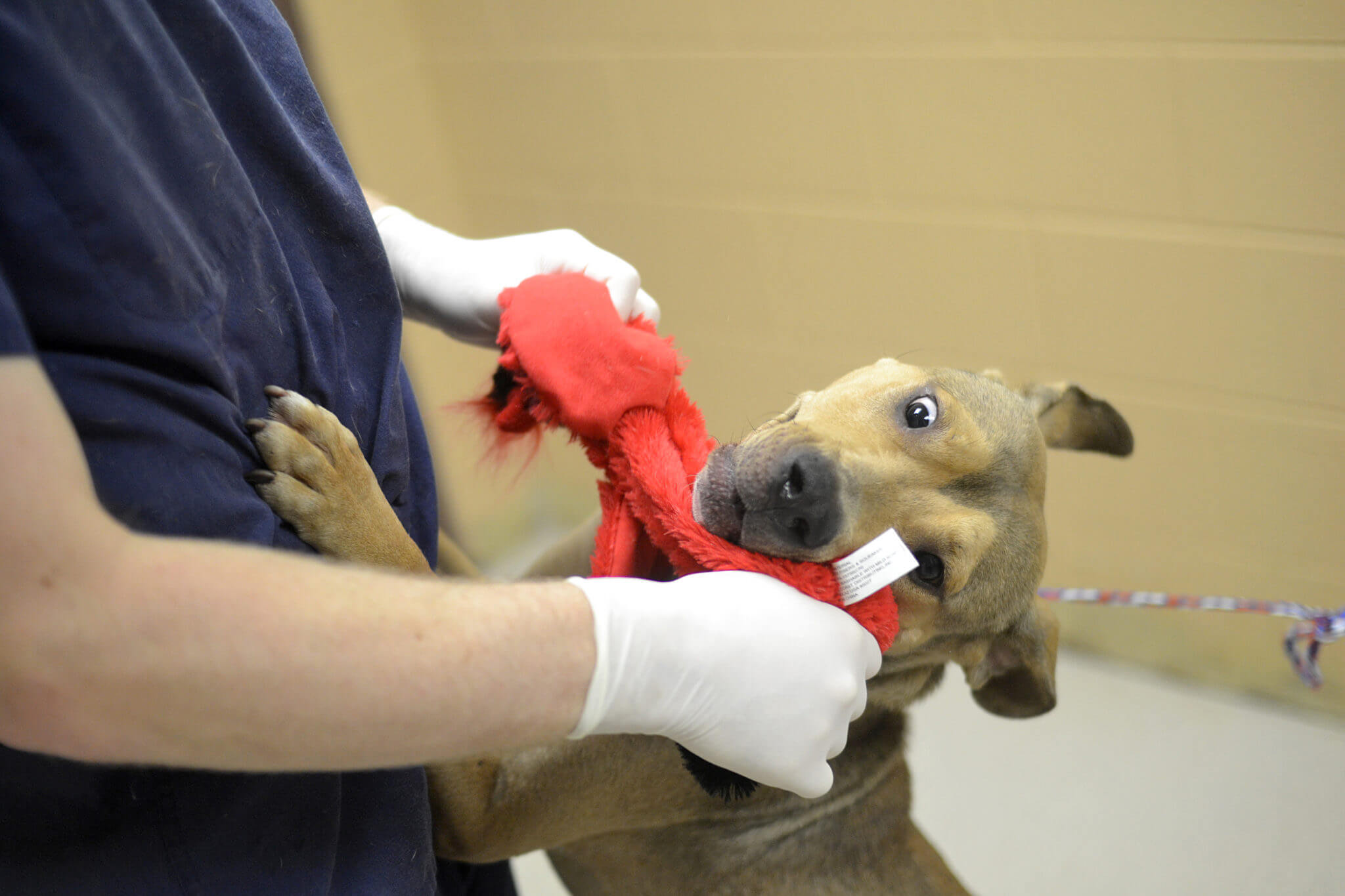
A staff member at the Berman Center for Animal Care cuddling with some of her favorite adoptable pit-bulls.
When tragic incidents with pit bulls happen, as they have very recently in the metro Detroit area, many are quick to blame the breed, without seeing where the true responsibility lies: the dog’s owner. We share in the sadness of these tragedies, and it is understandable that, in the immediate aftermath, individuals try to find one simple solution to ensure similar incidents never happen again. The problem, however, is much broader and complex than one fix-all solution.
At MHS, we see thousands of loving Pit Bulls and Pit Bull mixes come through our shelters each year who are then happily adopted out into loving new homes. Painting with a broad brush may seem like a viable solution in the moment, but it doesn’t get to the heart of the issue, which is not the breed of dog, but rather the intentions and actions of some dog breeders, trainers and owners. While genetics certainly plays a significant role in any dog’s personality, who that dog becomes is influenced as much –if not more – by their environment and the actions of their owners.
When a dog enters our shelters, Pit Bull or otherwise, we assess basic health and temperament. We treat every animal as an individual – as it should be. We work to discover the true personality of each dog – to make better matches and help ensure forever homes. Temperament is often confused for behavior. Behavior issues are opportunities for rehabilitation depending on the severity of the behavior and the expert resources available. At MHS, we are fortunate to have experts in animal behavior on staff. Temperament, on the other hand, is an inherent trait that will not change in an animal and could create a potentially adverse, or dangerous, situation.

A pit bull type dog participating in a temperament evaluation at MHS.
At MHS our mission is to save lives; every animal has a chance. In that process, it is also our responsibility to help ensure that the animals we place will have safe forever homes and will not be dangerous to other animals and families in the community. MHS has, and continues to, research the effectiveness and validity of our evaluation process and we utilize third party experts, such as Cornell University’s College of Veterinary Medicine to guide our processes.
Because every animal is an individual, we firmly stand against breed-specific legislation – which discriminates purely on the physical appearance, the breed, of a dog. These legislative efforts imply that a specific breed is born aggressive and that there is “nothing that can be done about it”. This belief is antiquated, false and is highly ineffective in dealing with aggressive animals in our community.
Many people want to suggest banning a specific breed in response to these tragic attacks; however this would fail to provide the right solution for multiple reasons:
- Dangerous dogs are most often a result of irresponsible ownership practices, breeding and training rather than breed of dog.
- Some communities that have enacted breed specific legislation have re-evaluated their policies and found them to be ineffective in reducing the number of dog bites, and in many cases, also very costly to implement and enforce.
- Responsible ownership is the most important component in preventing dog attacks. Virtually any breed of dog can be aggressive towards people or other animals and pet owners must take proper precautions to decrease the likelihood of an incident. Owners should ensure that their animals are supervised and effectively contained when outdoors, and on a leash when walking.
- Banning a breed fails to account for negligent owners who allow their animals to engage in dangerous behavior and instead punishes owners who responsibly care for their dogs.
- It is, at best challenging to enforce, and often highly subjective and arbitrary in its application.
There are multiple effective alternatives to breed specific legislation, including:
- Promote responsible ownership practices such as training, socialization and veterinary care
- Require that guardians supervise and effectively contain their animals when outdoors, and keep dogs on a leash when walking.
- Effectively and aggressively enforce existing laws regarding dangerous dogs – recent instances can, and are, covered in existing laws.
- Increase fines and penalties for guardians who allow their dogs to roam loose
- Increase efforts from animal control to respond to animals at large and uniformly and consistently address violations with owners or guardians
- Require that animals that are found roaming loose be spayed or neutered before returning them to their owners. Aggression is more likely to occur in dogs that are unsterilized.
- Establish an anti-tethering ordinance. Chained dogs are not as well socialized as indoor household pets. They are also unable to flee in a fearful situation, which leaves them with the only option to bite.
If we focus strictly on one breed of dog as opposed to the individual behavior of a dangerous or vicious dog, we are addressing the wrong issue and not protecting our community or the innocent dogs who reside in there.

Unfortunately, some misguided individuals take a “Donald Trump” approach when the focus should be on the negligent owners, rather than the poor dogs. Glad to see that the owner in the most recent mauling case of the 4 year old child is facing some serious charges. That’s where the blame lies.
I live in Port Huron where a woman was tragically killed by a pit and a husky/pit mix this week. It’s horrible – no question. The local editorial writers immediately started calling for a ban on pits and pit mixes. How about instead we put policing into action and nail the sub-humane people promoting the (heavily rumored) dog fighting practices in the area?
Hi there, not sure if you’ve read an updated news story on this but the coroner actually ruled her death a suicide. She walked over a mile in her bare feet to throw herself over that fence. The women intentionally exposed herself to danger, she did it on purpose.
The owner had properly and responsibly kept his dogs in a fenced in yard, The dogs were destroyed anyway.